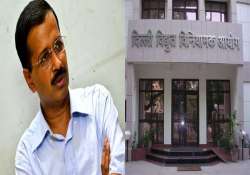DERC hikes power tariff, Kejriwal government fumes
New Delhi: Power tariff in the national capital was today hiked by up to eight per cent by the Delhi Electricity Regulatory Commission notwithstanding ruling Aam Aadmi Party's commitment to slash the rates. Arvind Kejriwal

New Delhi: Power tariff in the national capital was today hiked by up to eight per cent by the Delhi Electricity Regulatory Commission notwithstanding ruling Aam Aadmi Party's commitment to slash the rates.
Arvind Kejriwal government reacted angrily, saying it condemns the regulator's decision to increase the tariff which will come into effect from tomorrow.
Before coming to power, AAP had promised that it will slash the rates of power for Delhiites but did so only in selected slabs, prompting BJP to term it as“eyewash”.
DERC chairman P D Sudhakar told PTI that the fuel cost adjustment has resulted in hike in surcharge which will be to the tune of 8 per cent for BSES Yamuna Power Ltd, 6 per cent for BSES Rajdhani and 7 per cent for Tata Power Delhi Distribution Ltd.
“It is a surcharge. We have decided to effect the hike to adjust the power purchase cost of the distribution companies,” Sudhakar said. DERC will review the hike in the form of fuel surcharge after three months.
He said power distribution companies are facing financial difficulties and ways must be explored to help them.
The hike will be on energy charges as well as fixed charges but will not be applicable on the additional eight per cent surcharge which was levied to help the past dues.
A government spokesperson said the “Delhi Government strongly condemns the decision to hike the tariff. When audit by CAG has already been ordered, such a hike is uncalled for.” He said the DERC should have waited for the outcome of CAG audit before putting burden on the people at a time when lot of questions are being raised on the functioning of these power distribution companies.
The DERC had introduced fuel surcharge in 2012 to help the private power distribution companies adjust their power purchase cost.
While hiking the tariff in July last year, the DERC had subsumed the surcharge.
The tariff hike by the DERC came on a day when Chief Minister Arvind Kejriwal accused the discoms of trying to “blackmail” the government by threatening power cuts up to 10 hours a day.
Arvind Kejriwal government reacted angrily, saying it condemns the regulator's decision to increase the tariff which will come into effect from tomorrow.
Before coming to power, AAP had promised that it will slash the rates of power for Delhiites but did so only in selected slabs, prompting BJP to term it as“eyewash”.
DERC chairman P D Sudhakar told PTI that the fuel cost adjustment has resulted in hike in surcharge which will be to the tune of 8 per cent for BSES Yamuna Power Ltd, 6 per cent for BSES Rajdhani and 7 per cent for Tata Power Delhi Distribution Ltd.
“It is a surcharge. We have decided to effect the hike to adjust the power purchase cost of the distribution companies,” Sudhakar said. DERC will review the hike in the form of fuel surcharge after three months.
He said power distribution companies are facing financial difficulties and ways must be explored to help them.
The hike will be on energy charges as well as fixed charges but will not be applicable on the additional eight per cent surcharge which was levied to help the past dues.
A government spokesperson said the “Delhi Government strongly condemns the decision to hike the tariff. When audit by CAG has already been ordered, such a hike is uncalled for.” He said the DERC should have waited for the outcome of CAG audit before putting burden on the people at a time when lot of questions are being raised on the functioning of these power distribution companies.
The DERC had introduced fuel surcharge in 2012 to help the private power distribution companies adjust their power purchase cost.
While hiking the tariff in July last year, the DERC had subsumed the surcharge.
The tariff hike by the DERC came on a day when Chief Minister Arvind Kejriwal accused the discoms of trying to “blackmail” the government by threatening power cuts up to 10 hours a day.